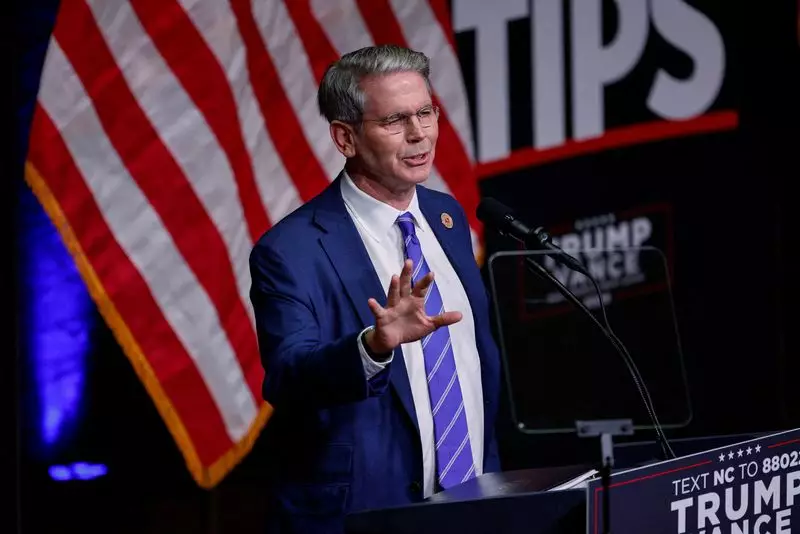The recent nomination of Scott Bessent as the U.S. Secretary of the Treasury by President-elect Donald Trump marks a pivotal moment in American economic leadership. As the financial landscape witnesses substantial turbulence and uncertainty, the implications of this decision resonate well beyond Wall Street’s immediate reactions. Bessent’s nomination signifies a possible reorientation of U.S. economic policy, particularly in areas such as trade, taxation, and regulatory frameworks.
The selection of Bessent to serve as Treasury Secretary followed a rigorous and often chaotic vetting process. Initially, high-profile candidates like Marc Rowan, the CEO of Apollo Global Management, and former Federal Reserve Governor Kevin Warsh were considered frontrunners. The competition for this influential cabinet position led to discussions that captivated financial observers, given Trump’s ambitious plan to reshape U.S. economic policies, notably through global trade tariffs and tax reforms. Ultimately, Bessent’s extensive background in finance and macroeconomic strategy gave him a competitive edge, along with his close interactions with Trump during the transition period.
Bessent’s experience is rooted in a long career in finance, where he worked for notable figures including George Soros and Jim Chanos. He has been recognized for his capacity to leverage his investment acumen to inform economic policy. Bessent’s practical stance on economic matters suggests that he will not only be an advocate for deregulation and tax reforms but also a stabilizing presence amidst the volatile forces of global markets.
The market’s immediate reaction to Bessent’s nomination was one of cautious optimism. Strategists noted that his appointment could potentially alleviate the fears of severe trade tariffs that many had anticipated under Trump’s administration. Analysts like Ryan Sweet from Oxford Economics emphasize that Bessent favors a less aggressive approach to tariffs, viewing this as a constructive pivot from the hardline stance taken during Trump’s campaign.
The nominee’s track record of supporting tax reforms is crucial as well. Investors have long anticipated reforms that would stimulate economic activity, and Bessent’s acknowledgment of the need for increased bank lending and energy production aligns with these expectations. His previous writings, including insights shared in The Wall Street Journal, reflect a belief that the market’s buoyancy post-election signaled an eagerness for renewed growth and lower volatility—conditions that he aims to foster as Treasury Secretary.
As Treasury Secretary, Bessent will step into a role that commands extensive influence over the U.S. economy. His responsibilities will encompass the management of the federal budget, the coordination of tax policies, and overseeing the $28.6 trillion Treasury debt market. Additionally, he will oversee the enforcement of financial regulations and the administration’s economic sanctions policies, posing several challenges that he must navigate.
One pressing issue Bessent will face is the management of an expanding federal deficit, projected to increase by nearly $8 trillion due to the proposed extension of tax cuts and additional financial incentives promised during Trump’s presidency. The fiscal landscape may strain the government’s capacity to finance its obligations without risking market stability. Bessent has asserted that prudent economic strategies can ignite revenue growth, providing much-needed relief for the burgeoning debt.
Moreover, Bessent inherits key responsibilities from the previous administration concerning international cooperation—specifically support for Ukraine during its ongoing conflict with Russia. How Bessent approaches this issue will be critical in defining the U.S.’s foreign policy stance, particularly given Trump’s inclination towards reevaluating U.S. financial commitments abroad.
Moving forward, Bessent’s strategies will determine not only the trajectory of U.S. economic policy but also influence global markets. His previous critique of prevailing market sentiments during Trump’s campaign suggests he has a unique perspective that could help reshape how economic data and policies are interpreted moving forward. This contrasts with the environment under the previous Treasury Secretary, Janet Yellen, who prioritized addressing climate change and advocating for sustainable finance.
Bessent’s nomination, thus, represents a contrasting ideological framework, focusing more on traditional economic indicators and immediate market responsiveness rather than long-term sustainability strategies. While he may dial back some of Yellen’s initiatives in favor of conventional economic growth tactics, such shifts will require careful calibration to maintain balance in both domestic and international financial arenas.
As Scott Bessent steps into the role of Treasury Secretary, economic stakeholders will be keen to observe how his strategic decisions will unfold, navigate challenges, and ultimately shape the financial future of the United States. The stakes are high, and the implications of his policies will resonate widely throughout the global economy.

